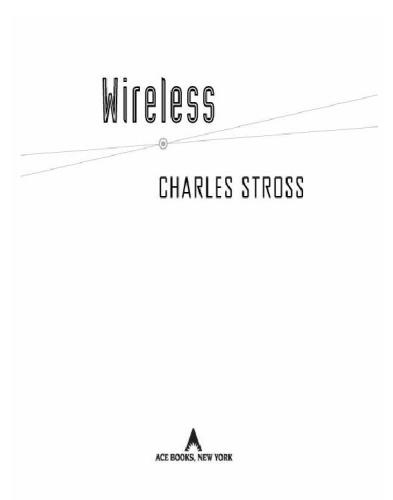
Wireless
کتاب های مرتبط
- اطلاعات
- نقد و بررسی
- دیدگاه کاربران
نقد و بررسی

May 18, 2009
Prolific novelist Stross pauses to collect short stories that have not (yet) been stitched up into his longer work. Stories that move the U.S.–U.S.S.R. conflict onto a massive disk in another galaxy (Locus Award–winner “Missile Gap”), offer a spam-filter solution to the Fermi paradox (“MAXOS”) and suggest clever bargains with the devil in a newly frozen Scotland (“Snowball’s Chance”) demonstrate Stross’s ability to crisscross genres, blending SF, fantasy, horror and espionage. He also pays homage to his literary forebears, combining Lovecraft and the Iran-Contra scandal (“The Colder War”) and bringing in Carl Sagan and Stephen Jay Gould as characters. Though individual pieces are well-done and deservedly popular, the collection has an overall sense of early drafts and reworkings of other pieces, as with “Trunk and Disorderly,” a P.G. Wodehouse–on–Mars “test run” for 2008’s Saturn’s Children
.

June 1, 2009
Nine stories from the past decade showcase the author's hard-science, hi-tech comfort zone, but also his desire to push boundaries.
Stross (The Revolution Business, 2009, etc.) leads with the substantial"Missile Gap," a Cold War-era alternate reality tale that brims with existential gloom-and-doom. So do the somewhat similar"A Colder War," which features splendidly terrifying, implacable aliens, and"Unwirer" (a collaboration with Cory Doctorow), which sketches a future America in which it's a crime to set up a wi-fi connection. Elsewhere, humor pushes to the fore."Down on the Farm" brings back long-suffering protagonist Bob Howard for another installment in the author's established computational-magic series, and Stross even tries a fantasy Jeeves and Wooster pastiche (A for effort, B for execution, C- for humor)."Palimpsest," a highly compressed, previously unpublished novel about time travel and reality control, would have been more effective if it hadn't taken as its premise the central idea from Isaac Asimov's The End of Eternity. Overall, stylistic limitations become apparent as the author reuses the same literary devices: cute subheadings, textual slide shows, paranoid bureaucracies, etc.
Fans will want to check this out, but newcomers will be far better off with any one of Stross's vastly superior novels.
(COPYRIGHT (2009) KIRKUS REVIEWS/NIELSEN BUSINESS MEDIA, INC. ALL RIGHTS RESERVED.)

July 1, 2009
With such breathtakingly imaginative novels as Accelerando (2005) and the Nebula-nominated Saturns Children (2008), Stross has proven his mettle as a leading speculative-fiction innovator. Yet his new short story collection showcases not only his visionary prowess but also his ability to enthrall with plain good storytelling. If theres a recurring element in these nine stories and novellas, its Stross penchant for taking familiar cultural scenarios and sending them soaring in unpredictable directions. Missile Gap presents an alternate-history cold war with a bizarre twist: the U.S. and Soviet Union have been transplanted to an immense, flattened disk by mysterious, alien forces and left to struggle with their enmity in a baffling new environment. Rogue Farm morphs the cherished family farm into something freakish in a future of transhumans and rebootable personalities. In Snowballs Chance, the devil finds a willing bargainer in a postglobal warming pub. Whether one is a Stross neophyte or a die-hard fan, these stories are guaranteed to tease and sometimes confound the imagination.(Reprinted with permission of Booklist, copyright 2009, American Library Association.)

























دیدگاه کاربران